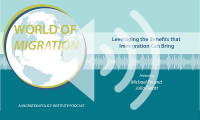
Michael Fix
Senior Fellow
Michael Fix is a Senior Fellow at the Migration Policy Institute, and previously served as its President. He joined MPI in 2005, as Co-Director of MPI’s National Center on Immigrant Integration Policy and later assumed positions as Senior Vice President, Director of Studies, and CEO.
Mr. Fix’s research focus is on immigrant integration and the education of immigrant children in the United States and Europe, as well as citizenship policy, immigrant children and families, the effect of welfare reform on immigrants, and the impact of immigrants on the U.S. labor force.
|
Media Requests |
Prior to joining MPI, Mr. Fix was Director of Immigration Studies at the Urban Institute in Washington, DC, where his focus was on immigration and integration policy, race and the measurement of discrimination, and federalism.
Mr. Fix is a Policy Fellow with IZA in Bonn, Germany. In December 2013, he was nominated to be a member of the National Research Council’s Committee on the Integration of Immigrants into U.S. Society, which produced a seminal study on the integration of immigrants in the United States.
Previously, he served on the National Academy of Sciences’ Committee on the Redesign of U.S. Naturalization Tests and on the Committee on the Health and Adjustment of Immigrant Children. He also served as a member of the Advisory Panel to the Foundation for Child Development’s Young Scholars Program. In 2005 he was appointed to the State of Illinois’ New Americans Advisory Council, and in 2009 to the State of Maryland’s Council for New Americans.
Mr. Fix received a JD from the University of Virginia and a bachelor of the arts degree from Princeton University. He did additional graduate work at the London School of Economics.
Bio Page Tabs
In this World of Migration podcast episode, MPI Senior Fellow Michael Fix speaks with Senior Policy Analyst Julia Gelatt about the fiscal impacts of immigration, the importance of immigrant integration, how a greater focus on credential recognition could allow immigrants to more fully utilize the academic and professional skills they bring with them, and much more.
This webinar discusses the first-ever profile of the 30 million immigrant-origin adults in the United States who lack a postsecondary credential and offers analysis of the significant payoff credentials could bring in terms of workforce participation and wages.
This webinar highlights findings from an MPI report examining the potential impacts of expected changes to the public charge rule by the Trump administration. Leaked draft versions suggest the rule could sharply expand the number of legally present noncitizens facing difficulty getting a green card or extending a visa as a result of their family's use of public benefits. The rule likely would discourage millions from accessing health, nutrition, and social services for which they or their U.S.-citizen dependents are eligible.
A presentation of the first-ever U.S. estimates on the economic costs of brain waste for highly skilled immigrants, their families, and the U.S. economy. The researchers discuss their findings in terms of the billions of dollars in forgone earnings and unrealized taxes when college-educated immigrants are relegated to low-skilled work.
Nearly 2 million college-educated immigrants in the United States are stuck in low-skilled jobs or are unemployed—a phenomenon known as brain waste. In this brief video, MPI researchers discuss their key findings on immigrant skill underutilization and the resulting billions of dollars in unrealized wages and forgone federal, state, and local tax receipts.
Pages
Recent Activity
The Task Force on New Americans launched by the Biden administration represents an important occasion to deepen understanding of immigrant integration issues and to identify ways to address them. MPI’s National Center on Immigrant Integration Policy, which has long argued for the need to create such an office within the White House, has developed recommendations for the task force in key areas, drawing from its extensive record of research, policy analysis, and technical assistance.
















Narrowing the Skills Gap: Equipping Immigrant-Origin Workers with Postsecondary Credentials
A Deeper Look at the DREAMers Who Could Feature in the Legalization Debate in Congress
Nearly 3 Million U.S. Citizens and Legal Immigrants Initially Excluded under the CARES Act Are Covered under the December 2020 COVID-19 Stimulus
The Role of Immigrant Health-Care Professionals in the United States during the Pandemic
How the Fear of Immigration Enforcement Affects the Mental Health of Latino Youth
Anticipated “Chilling Effects” of the Public-Charge Rule Are Real: Census Data Reflect Steep Decline in Benefits Use by Immigrant Families
As U.S. Health-Care System Buckles under Pandemic, Immigrant & Refugee Professionals Could Represent a Critical Resource
Millions Will Feel Chilling Effects of U.S. Public-Charge Rule That Is Also Likely to Reshape Legal Immigration
People Leave Footprints: Millions More Unauthorized Immigrants Cannot Be ‘Hidden’ in Data Estimates
Through the Back Door: Remaking the Immigration System via the Expected “Public-Charge” Rule
Will DREAMers Crowd U.S.-Born Millennials Out of Jobs?
Immigrants and the New Brain Gain: Ways to Leverage Rising Educational Attainment
Leaked Draft of Possible Trump Executive Order on Public Benefits Would Spell Chilling Effects for Legal Immigrants
Repealing Birthright Citizenship: The Unintended Consequences
County-Level View of DACA Population Finds Surprising Amount of Ethnic & Enrollment Diversity